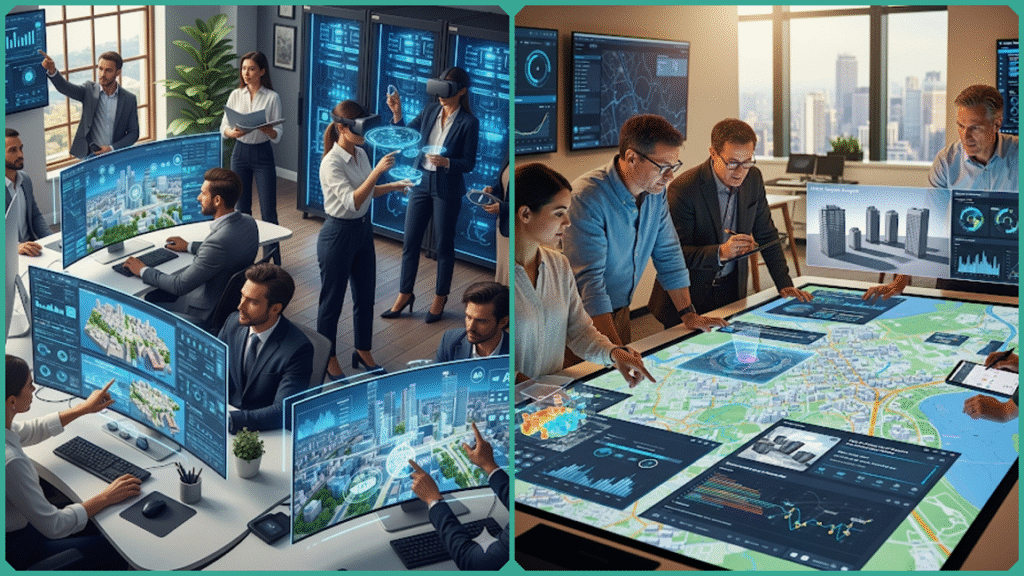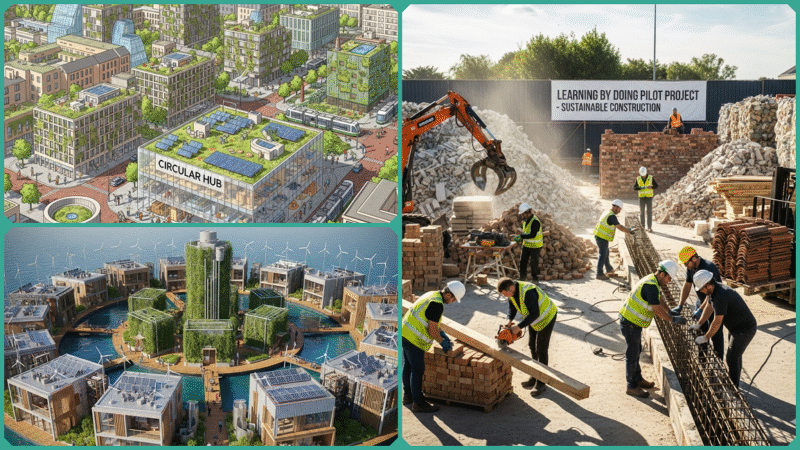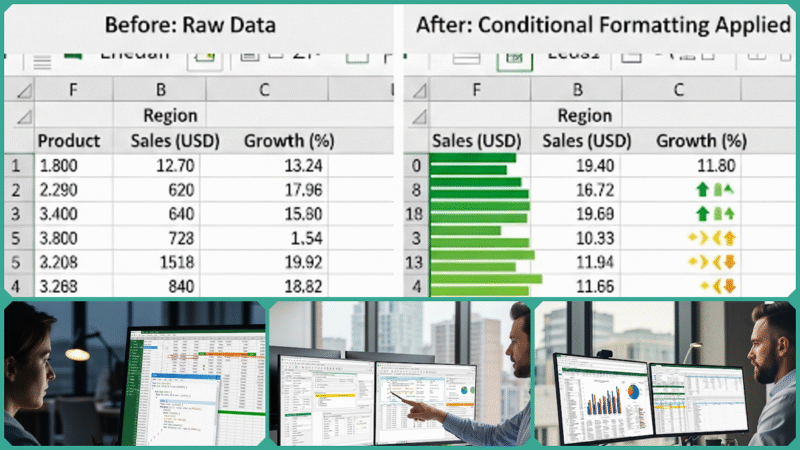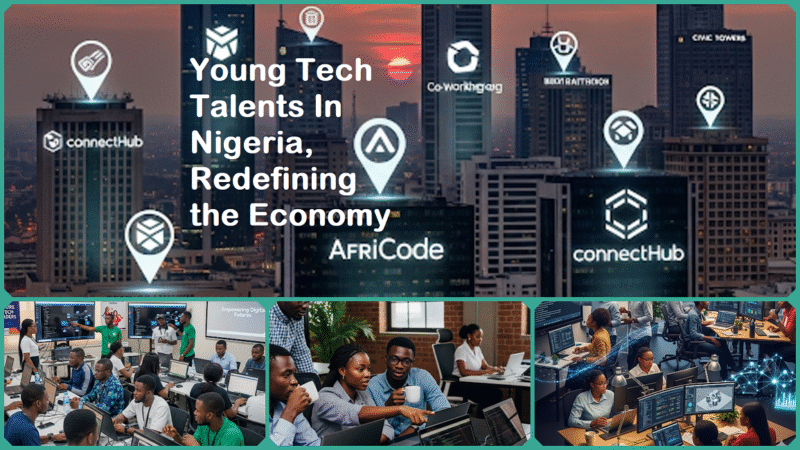Top Urban and Regional Planning Jobs in the Era of AI and ML
Estimated reading time: 22 minutes
The fields of urban and regional planning are undergoing a profound transformation driven by advancements in Artificial Intelligence (AI) and Machine Learning (ML). Traditionally focused on designing sustainable communities, managing land use, and revitalizing urban spaces, planning professionals are now interfacing with sophisticated technologies that analyze vast datasets, simulate future urban scenarios, and optimize decision-making processes.
This evolution holds tremendous significance for present-day urban planners who are actively seeking to adapt and evolve their careers in response to rapidly changing urban environments. It is equally important for students and recent graduates who aim to align their education and skillsets with the future demands and challenges of urban development.

Additionally, researchers who are dedicated to studying emerging trends in urbanization and city planning will find this evolution critical to their work. Policymakers responsible for managing city governance must also consider these changes carefully as they develop strategies and policies to effectively address the complexities of modern urban life.
Understanding how artificial intelligence (AI) and machine learning (ML) are fundamentally transforming urban planning jobs not only opens up a wide array of exciting new career pathways but also highlights the essential skills and knowledge required to remain competitive in this rapidly evolving field.
Furthermore, it inspires professionals and stakeholders alike to pursue more impactful, innovative, and inclusive urban development strategies that better serve diverse communities and address complex challenges.
Key Concepts and Theories in AI-Driven Urban Planning
Urban and regional planning as a discipline traditionally encompasses activities such as land use analysis, zoning regulations, community engagement, economic and environmental assessments, and infrastructure design. These tasks aim to create well-organized, sustainable, and livable urban environments.
However, with the rise of Artificial Intelligence (AI) and Machine Learning (ML), the field is experiencing a paradigm shift often referred to as AI Urbanism — a socio-technical evolution where AI technologies are integrated systematically to transform how cities are planned, managed, and experienced.
What is AI Urbanism?
AI Urbanism represents a multifaceted and globally diverse paradigm shift characterized by the integration of AI across urban sectors with a focus on sustainability, equity, and ethical foresight. Unlike traditional urban planning, which largely depends on human intuition and limited datasets, AI Urbanism leverages the processing power of AI systems to analyze vast quantities of urban data in real time, uncover hidden patterns, and simulate future urban scenarios with improved precision.
This creates opportunities for smarter, more responsive urban environments that can better serve citizens’ needs. At its core, AI Urbanism is not about technological solutionism but about enhancing traditional planning tools with AI capabilities for more informed and data-driven decision-making. It requires interdisciplinary collaboration and emphasizes ethically sound urban futures.
Key AI and ML Concepts Relevant to Urban Planning
Artificial intelligence and machine learning aren’t just buzzwords; they’re powerful tools that are redefining what’s possible in urban planning. To truly leverage their potential, planners need to grasp several core concepts that enable these technologies to analyze data, predict trends, and optimize urban systems.
Gaining a thorough understanding of these key ideas will empower and enable you to transition from merely using software tools to strategically applying artificial intelligence in a way that promotes smarter, more efficient, and sustainable development of cities over the long term.
This deeper knowledge will allow you to harness AI technologies effectively to create urban environments that are not only technologically advanced but also environmentally responsible and socially beneficial.
Geographic Information Systems (GIS) Enhanced by AI
Geographic Information Systems (GIS) have long served as a foundational tool in the field of urban planning, playing a critical role in enabling detailed spatial analyses of various important factors such as population densities, patterns of land use, transportation networks, and environmental characteristics.
In recent years, advances in artificial intelligence (AI) algorithms have significantly enhanced the capabilities of GIS by automating complex data processing tasks, improving the accuracy and efficiency of pattern recognition, and facilitating advanced predictive spatial modeling.
These technological improvements allow urban planners to generate far more precise and reliable predictions regarding how urban areas are likely to evolve and develop over time. As a result, planners can optimize land use strategies and infrastructure development projects, leading to smarter and more sustainable urban growth [raise.me].
Predictive Analytics and Simulation
Machine learning models play a crucial and highly significant role in the field of predictive analytics by efficiently processing and analyzing complex and multifaceted urban data streams. These advanced models help forecast a wide range of important factors, including growth trends, economic impacts, environmental changes, and infrastructure needs in urban settings.
By leveraging these sophisticated simulations, urban planners are able to visualize and compare multiple potential development scenarios in detail. This also allows them to thoroughly assess various resource allocation strategies and better anticipate the likely effects and consequences of different policy or development decisions before they are implemented.
As a result, the use of machine learning models substantially reduces uncertainties and mitigates risks associated with the execution of urban plans, leading to more informed and effective decision-making processes in city planning and management.
Natural Language Processing (NLP) and Large Language Models (LLMs)
Natural Language Processing (NLP) technologies, especially advanced Large Language Models (LLMs) such as ChatGPT, play a crucial role in supporting urban planning efforts by efficiently analyzing vast amounts of public feedback.
These technologies are capable of extracting valuable insights from complex policy documents, thereby aiding planners in understanding community needs and regulatory frameworks. Additionally, NLP enhances communication channels with a wide range of diverse stakeholder groups, including residents, government officials, and developers.
This leads to improved transparency in the planning process, promotes greater inclusivity by ensuring all voices are heard, and helps streamline the creation of detailed planning reports and community engagement materials.
Furthermore, the capability of AI to handle multilingual content and conduct large-scale document analysis significantly broadens participation in urban planning processes, making it easier for people from different linguistic backgrounds to contribute effectively.
AI-Enabled Automation
AI technology automates a wide range of repetitive and routine planning tasks, including activities like reviewing zoning applications, monitoring compliance with regulations, and collecting large amounts of relevant data. By handling these time-consuming and often monotonous tasks, AI frees human planners to dedicate more attention to complex, higher-level conceptual thinking and ethical decision-making processes that require human judgment and creativity.
Furthermore, AI systems serve as valuable tools to assist planners with quality control and the detection of errors, functioning primarily as decision-support aids rather than outright replacements for human expertise. This collaborative and synergistic relationship significantly enhances the overall efficiency and effectiveness of planners, allowing them to achieve better outcomes in their work.
The Urban Planning Process and AI Integration
AI applications vary significantly across the different phases of the urban planning process, playing a crucial role in enhancing efficiency and decision-making at each stage. These applications help urban planners analyze data, predict trends, optimize designs, and facilitate community engagement throughout the entire development cycle. From initial research and data collection to final implementation and monitoring, AI tools provide valuable insights and support that improve the overall quality and sustainability of urban environments.
- During the Exploration Phase, AI technologies meticulously examine vast and complex datasets to extract valuable insights about the current urban environment. This comprehensive analysis enables a deeper understanding of existing conditions, patterns, and challenges within the cityscape. By leveraging these sophisticated data-driven insights, AI supports urban planners in crafting well-informed and strategic initial planning objectives that serve as the foundation for subsequent development stages.
- During the Feasibility and Master Planning Phase, advanced AI-driven spatial analysis combined with detailed scenario simulations plays a crucial role in supporting a thorough assessment of various potential urban designs and strategic development plans. These innovative technologies enable planners to explore multiple design options, evaluate their impacts, and optimize urban layouts effectively.
- In the Formal Planning Phase, advanced AI tools play a crucial role in effectively managing complex participatory processes by facilitating seamless communication and collaboration among stakeholders. These tools also significantly enhance the efficiency and accuracy of document generation, ensuring that all necessary materials are prepared promptly and adhere to required standards. Additionally, AI technologies help ensure strict regulatory compliance by continuously monitoring relevant guidelines and automatically flagging any potential issues, thereby supporting planners in maintaining adherence to legal and procedural requirements throughout the phase.
Ethical and Practical Considerations
The integration of artificial intelligence in urban planning requires critical and thoughtful ethical foresight, given that AI-driven decisions have the potential to introduce risks such as bias or exclusion if the underlying data and algorithms are not meticulously designed and tested.
Ensuring transparency in how decisions are made, safeguarding data privacy, and promoting the equitable inclusion of marginalized and underrepresented voices are essential concerns that must be addressed throughout the process.
Therefore, urban planners are tasked with the important responsibility of combining advanced technological proficiency with a deep and unwavering commitment to strong ethical judgment. This approach is necessary to guarantee that AI applications are implemented in ways that align closely with broader social equity objectives and long-term sustainability goals [acss.org.uk].
Current Trends and Developments in Urban and Regional Planning Jobs
The field of urban and regional planning is in a period of significant transformation. Driven by challenges like rapid urbanization, climate change, and the demand for more equitable and resilient cities, new job roles are emerging that require a blend of traditional planning expertise and cutting-edge technical skills.
Planners are now moving beyond their conventional roles to become specialists in sustainability, smart city infrastructure, and data-driven policy. This evolution is creating a need for a new type of professional—one who can navigate the complexities of urban systems while leveraging technology to build more livable and sustainable communities.
AI as a Tool for Enhanced Planning Roles
The integration of Artificial Intelligence (AI) into urban and regional planning is redefining the profession rather than replacing human planners. Instead of being displaced, planners are increasingly required to become proficient in leveraging AI tools to analyze complex and large datasets, build dynamic land use models, and better engage with communities.
This significant shift empowers urban planners to more effectively tackle some of the most urgent and complex challenges faced by cities today—such as severe traffic congestion, persistent housing shortages, and the critical need for environmental sustainability—with a much higher level of precision, accuracy, and overall efficiency in their planning and implementation processes.
AI tools accelerate the processing and analysis of vast amounts of urban data, which planners traditionally handled manually or with less sophisticated software. For example, machine learning (ML) models can predict urban growth patterns, economic impacts, and environmental changes more accurately than before, helping planners to simulate multiple scenarios and optimize urban development strategies.
Evolving Planner Roles in AI-Assisted Environments
As artificial intelligence technologies continue to advance and become more sophisticated, the roles and responsibilities of planners are undergoing significant transformations in several important and impactful ways:
From Data Processor to AI-augmented Analyst
Planners are increasingly shifting their focus towards interpreting the valuable insights generated by AI systems and skillfully integrating these insights into broader, more comprehensive planning frameworks. Instead of spending the majority of their time compiling, organizing, and cleaning raw data, they now dedicate more effort to making sense of AI-driven outputs and applying them effectively within strategic decision-making processes.
Quality Controllers and Ethical Stewards
Planners play a crucial role in carefully monitoring and thoroughly verifying AI outputs, ensuring that all decisions made align closely with broader societal values and principles. They work diligently to prevent the perpetuation of biases that may be inherited from historical data, which can often reflect past inequalities or prejudices.
By actively overseeing these complex processes and ensuring constant vigilance, planners play a crucial role in maintaining high ethical standards and promoting fairness in AI-driven decision-making systems. Their involvement helps to safeguard against biases and ensures that these technologies are used responsibly and equitably across various applications.
Community Engagement Facilitators
AI-powered Natural Language Processing tools play a crucial role in helping planners analyze and interpret large-scale public feedback more effectively. These advanced technologies enable a deeper understanding of diverse community opinions, thereby significantly enhancing inclusivity and responsiveness throughout the entire public participation process.
By effectively leveraging these powerful tools, facilitators can significantly enhance their ability to ensure that a much wider and more diverse range of voices and perspectives are heard, acknowledged, and thoughtfully considered throughout the decision-making process. This inclusive approach ultimately leads to outcomes that are far more equitable, fair, and transparent for all parties involved.
Interdisciplinary Collaborators
Urban planners collaborate closely with a diverse range of professionals, including data scientists, AI specialists, and policymakers. Together, they design comprehensive, multi-faceted, and technology-enabled solutions that address the complex challenges of modern urban environments in innovative and effective ways.
These changes reflect a hybrid future where AI handles routine assessments and simulations, freeing planners to focus on complex, context-sensitive decisions and human-centered engagement. The evolution towards such roles requires planners to acquire new skills such as data literacy, AI oversight, and computational thinking alongside traditional planning expertise.
Real-World AI Applications Transforming Planning Jobs
Practical examples clearly demonstrate AI’s rapidly growing influence in the field of urban planning and development. For instance, in New York City, the Department of Transportation formed a strategic partnership with the AI technology company Blyncsy to leverage advanced computer vision and machine learning techniques.
This collaboration focuses on continuously monitoring crosswalk conditions throughout the city, allowing for more precise and targeted maintenance efforts that significantly enhance pedestrian safety and reduce accidents. Similarly, municipalities and city planners across the globe are increasingly adopting AI-driven tools such as digital twins, sophisticated GIS mapping, and dynamic simulations.
These technologies are used to accurately forecast potential climate-related risks, optimize the efficiency and reliability of transportation systems, and strategically plan future infrastructure investments that meet growing urban demands.
These technological innovations translate into a growing number of job opportunities for planners who possess skills in AI tools and methodologies. This is especially true for roles that are focused on the development of smart cities, sustainability planning, and the integration of technology into community engagement strategies.
As these fields continue to grow and expand at a rapid pace, planners who possess specialized expertise and knowledge in these particular areas will find themselves presented with a much wider range of diverse and highly rewarding career paths and opportunities available to them throughout their professional journeys.
Emerging Trends in the Job Market and Skills Demand
The urban and regional planning job market is undergoing a significant transformation, with new roles and skill sets becoming essential. The shift is being driven by the need for planners to address complex issues like climate change, social equity, and rapid technological advancements.
Consequently, the most in-demand professionals are those who can blend traditional planning principles with data literacy, analytical thinking, and technological proficiency. These emerging trends reflect a move toward more interdisciplinary, collaborative, and data-driven approaches to designing and managing our cities.
- Rising Demand for Technical Skills: There is a growing and significant increase in the demand for technical skills, particularly in areas such as AI-assisted Geographic Information Systems (GIS), machine learning (ML) modeling, advanced data visualization techniques, and proficiency in various programming languages. Among these, expertise in Python and R is especially highly valued and sought after in the industry.
- Growth of Interdisciplinary Jobs: Positions that uniquely combine urban planning with advanced AI system design, cutting-edge data science techniques, and comprehensive policy analysis are expanding at an exceptionally rapid pace across various sectors and industries.
- Focus on Ethical AI Use: Urban planners today are increasingly required to deeply understand and actively mitigate potential biases inherent in artificial intelligence systems, ensuring that the urban solutions they develop are fair, just, and equitable for all community members. This commitment to ethical AI use is essential in creating inclusive environments that serve diverse populations effectively.
- Flexible, Adaptive Career Paths: Urban planners must consistently and proactively update their skills and knowledge to effectively adapt to the rapidly emerging AI technologies as well as the continuously evolving and dynamic urban environments. This ongoing learning process is essential to remain relevant and capable in addressing new challenges and opportunities in city planning.
The Agility of Urban Planners in an AI-Enabled Future
AI’s role in urban planning and regional jobs represents not a threat but rather a strategic augmentation that enhances the capabilities of professionals in the field. Urban planners who choose to embrace AI as a vital and indispensable tool can experience significantly more efficient workflows, improved decision-making processes, and a greatly increased capacity to influence the development of sustainable and equitable cities.
As AI continues to reshape planning methodologies and transform traditional practices, professionals must develop strong skills in integrating advanced technology with human-centric approaches. This integration is essential for maintaining relevance, leadership, and a competitive edge in the ever-evolving field of urban and regional planning.
This comprehensive synthesis offers a clear and detailed picture of the ways in which artificial intelligence is actively transforming urban and regional planning jobs in the present day, while also providing a forward-looking perspective that is firmly anchored in the current realities and trends within the industry.
Job Outlook and Career Growth
The demand for urban and regional planners is expected to increase by approximately 13% between the years 2016 and 2026, which represents a growth rate that is considerably higher than the average growth rate for all occupations, typically around 7%.
This robust growth is driven by several important factors, including rapidly increasing urban populations, the need for expanded and improved infrastructure, and a growing awareness of sustainability challenges. These challenges demand expert planning interventions to create more livable, efficient, and environmentally conscious communities.
Drivers of Growth
Several important and influential factors are contributing to and driving this optimistic employment outlook:
- Population Growth and Urbanization: Cities across the globe are experiencing continuous and rapid expansion, leading to significant challenges for urban planners. These professionals must design and implement comprehensive housing solutions, develop efficient transportation networks, and build robust public infrastructure systems that can effectively support and manage the increasing population. This growth demands careful planning and innovative strategies to ensure sustainable and livable urban environments for the future.
- Environmental and Sustainability Challenges: Urban planners play a crucial and central role in designing and developing resilient urban systems that effectively address the wide-ranging impacts of climate change, the growing scarcity of natural resources, and the ongoing issues of environmental degradation. Their work involves creating strategies and solutions that promote sustainability while ensuring cities can adapt and thrive in the face of these significant challenges.
- Technological Advancements: The rapid and widespread adoption of AI-driven smart systems throughout urban environments is significantly increasing the demand for urban planners who possess specialized skills in technology integration. These planners are needed to effectively incorporate advanced technological solutions into the fabric of city planning and development.
- Revitalization and Infrastructure Projects: Both urban renewal initiatives and new development projects demand comprehensive planning expertise to guarantee not only functionality but also enhanced aesthetics and meaningful community benefits. These projects play a crucial role in transforming and improving urban spaces, making them more livable and sustainable for residents and visitors alike.
AI and Technology-Integrated Roles Expanding
As cities increasingly integrate advanced AI and Machine Learning technologies into their urban planning processes, a new and exciting wave of technology-driven careers in urban planning is beginning to emerge.
Urban planners who possess strong proficiency and hands-on experience with AI tools, sophisticated data analytics, and Geographic Information Systems (GIS) technologies will be in exceptionally high demand across a wide range of sectors, including both public agencies and private organizations.
These innovative roles offer not only greater job stability in an evolving job market but also present meaningful and impactful opportunities for professionals to actively contribute to shaping more sustainable and resilient urban futures for communities around the world.
Employment Sectors and Work Environment
The majority of urban and regional planners, approximately 68%, are employed by local government agencies, where they play a crucial role in community development and land use planning. However, a substantial portion of these professionals also find employment opportunities in other sectors such as
- Architectural firms
- Engineering companies
- Consulting services
- Various state government departments
These planners typically maintain a full-time work schedule during regular business hours, but their responsibilities often require them to work beyond the usual hours to attend public meetings, engage with community stakeholders, and meet important project deadlines and milestones.
Education and Professional Requirements
A master’s degree in urban or regional planning from an accredited and well-recognized program is typically required for most planner positions within the field. Obtaining this advanced degree provides essential knowledge and skills that are crucial for effective planning practice.
Additionally, pursuing professional certification, such as becoming a Registered Professional Planner (RPP), can significantly enhance career prospects by demonstrating a higher level of expertise and commitment. This certification also offers greater professional recognition among peers and employers, which can lead to expanded job opportunities and advancement within the industry.
Future Outlook (2024-2034)
More recent projections covering the period from 2024 to 2034 estimate a job growth rate of approximately 3%, which is roughly on par with the average growth rate for all occupations combined, reflecting a maturation and stabilization of the field over time.
During this upcoming decade, it is projected that there will be roughly 3,400 job openings annually. These opportunities are expected to arise mainly due to the retirement of current employees who have spent many years in their roles, as well as from job transitions and movements within the industry itself. This combination of factors will contribute significantly to the availability of new positions each year [bls.gov].
This data highlights the critical importance of continuous professional development and the need for workers to adapt and update their skills regularly, especially in light of the increasing integration of AI-enhanced technologies and tools in planning roles that are emerging across the sector.
This outlook highlights a highly promising and continuously evolving career landscape for urban and regional planners, particularly for those professionals who are well-prepared and eager to integrate advanced AI technologies and data-driven analytical methods into their everyday planning practice.
FAQs
Will AI replace urban planners?
AI will not replace urban planners. Instead, AI serves as a powerful tool that supports and enhances planners’ work by automating routine tasks and providing deeper data analysis. Human expertise remains essential for ethical judgment, community engagement, and complex decision-making processes. AI handles high-volume data processing and scenario modeling, but planners are critical in interpreting AI outputs, overseeing fairness, and ensuring that plans meet social and political needs.
What are the essential skills for urban planners in the AI age?
Urban planners need to develop a strong proficiency in several essential skill areas that are critical for their success and effectiveness in the field:
- Data Literacy: Understanding and working with big data and statistical tools.
- GIS and AI Proficiency: Using geographic information systems and AI tools for spatial and predictive analysis.
- Computational Thinking: Formulating urban problems for algorithmic solutions.
- Ethical and Equity Awareness: Recognizing and mitigating bias in AI to ensure equitable outcomes.
- Creativity and Communication: Crafting inclusive policies and engaging diverse stakeholders effectively.
How can students prepare for future urban and regional planning jobs?
Students should adopt a comprehensive interdisciplinary approach by effectively combining the core fundamentals of urban planning with related fields such as;
- Studies in data science and AI basics
- Hands-on experience with GIS technologies
- Participating in internships or projects focused on smart cities or tech-enabled planning
This unique blend of skills and knowledge equips graduates with the ability to effectively adapt to a wide range of tech-driven urban planning roles, enabling them to navigate the complexities of modern city development. It also empowers them to contribute meaningfully and significantly to innovative projects that shape the future of urban environments.
What new job titles might emerge in urban planning?
The integration of Artificial Intelligence (AI) and Machine Learning (ML) in urban planning is leading to the emergence of a variety of new specialized roles and career opportunities, including:
- Data-Driven Urban Planner: Focuses on using advanced analytics to guide planning decisions.
- Smart City Planner: Designs technology-infused urban infrastructure and systems.
- AI Systems Analyst: Develops and manages AI tools used for urban management.
- Community Engagement Specialist Using AI: Leverages AI tools like NLP to improve public participation and inclusivity.
How can policymakers benefit from AI in urban planning?
Policymakers greatly benefit from the advanced capabilities of AI in various ways, including its ability to:
- Optimize urban efficiency through real-time data and predictive analytics
- Enhance sustainability by monitoring ecological variables and forecasting impacts
- Improve inclusivity by analyzing community feedback with AI tools to craft equitable policies
Obtaining actionable insights for informed city governance will significantly contribute to creating a more responsive and adaptive approach to urban management. By leveraging these valuable insights, city officials can make well-informed decisions that better address the evolving needs of the community, ultimately enhancing the overall effectiveness and efficiency of urban governance.
Conclusion
AI and Machine Learning are no longer futuristic concepts but present realities shaping the future of urban and regional planning jobs. These technologies empower planners to analyze data at scale, forecast urban dynamics, and engage communities more inclusively, leading to smarter, more sustainable cities.
For current professionals, students, academics, and policymakers, embracing AI-driven skills and understanding its ethical dimensions are crucial for career growth and impactful urban development. The evolving landscape offers exciting opportunities to blend traditional planning with innovative technologies, promising fulfilling careers that shape the livable cities of tomorrow.
Those pursuing urban and regional planning careers are encouraged to build competencies in data analytics, GIS, AI applications, and community-centered planning to stay competitive in this rapidly changing field. As cities worldwide increasingly adopt AI tools, urban planners have the chance to lead transformative projects that improve the quality of life and sustainability for future generations.
Discover more from Skill to Grow
Subscribe to get the latest posts sent to your email.






